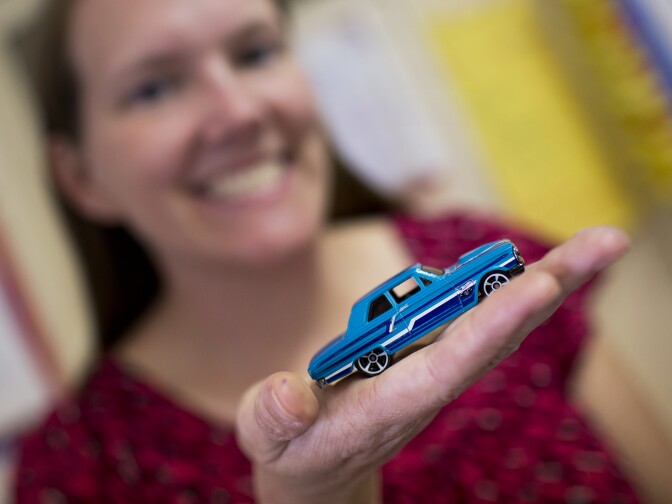A multi-national toy company is breaking ground by teaming up with university researchers to create classroom curriculum using one of its popular toy lines, but the effort is drawing criticism.
Called Speedometry, the project comes with dozens of Hot Wheels cars and tracks and an 85-page curriculum packet that guides fourth-grade teachers on how to teach math and science lessons using the toys.
“We’re trying to find out what helps a kid learn science and math content and what gets a kid engaged in science and math so that they want to continue to do it later on,” said USC Professor Morgan Polikoff, among the researchers studying Speedometry's impact on learning.
Polikoff along with six other professors and staffers from the USC Rossier School of Education received just over $1 million in grant funds over the last two years from El Segundo-based Mattel’s nonprofit foundation. In the first year, they studied how fourth-graders in 16 classrooms learned math and science with the toy cars. Last year, they expanded their research to 65 classrooms.
In the pilot study, Polikoff said researchers not only saw learning gains, but gathered “strong evidence” that students became excited about doing science, among them kids who did not understand the curriculum earlier.
Mattel has been manufacturing the Hot Wheels line for 47 years. The die-cast toys feature details patterned after full-size vehicles and are sought after by kids and collectors alike.
The company gave Speedometry kits to educators like Jaime Porres, a fifth-grade teacher at Brentwood Science Magnet in Los Angeles, who incorporated the toy cars in basic science lessons covering topics like potential and kinetic energy and how mass changes that energy.
“Kids this year put butter on their ramps. They buttered them up to see if they could make their cars go faster,” Porres said. “They weigh down their cars. They put [on] paper clips, tape them up to the cars, to see if that’ll make them go farther.”
According to USC's Polikoff, Speedometry is the first-of-its-kind partnership between a toy company and scholars at a school of education. Initial results from the study are positive, he said, and could interest other toy manufacturers in developing curriculum with their products.
It’s already easy to find lessons online aimed at teachers using Lego blocks and Minecraft, a video game that has spawned a line of toys, to teach math, writing, and problem-solving.
But some education scholars say lessons that promote commercial toy products cross a line.
“Schools are really kind of the last bastion of a non-corporate location, maybe schools and churches,” said Faith Boninger, a University of Colorado researcher who tracks how private companies place their products in schools. She said “kids need a place where they’re not defined by what a corporations would like them to believe.”
Boninger likes how Speedometry uses play to engage kids in academics. But she doesn’t like what she sees as Hot Wheels marketing making its way into the classroom in the guise of academic lessons.
Mattel disagrees.
"Speedometry is a curriculum, it’s not a product, it’s not a marketing campaign. It’s not something we market at all, as a matter of fact," said Mattel spokesman Alex Clark.
While the company may not be buying billboards for Speedometry, it does suggest buying the toy cars in the "Families" section of Mattel's Speedometry website: “But the fun doesn’t have to end when the school bell rings – you can bring Speedometry™ learning home!”
Project researcher Polikoff said commercialization is already in schools, and he points to textbooks written by corporations and corporate logos on school posters.
However, his team did worry about over-commercialization, he said. They asked Mattel to offer the curriculum free of charge. Teachers also aren't required to use Hot Wheels; they can use other toys as substitutes.
“The other absolute must was that we be allowed to do rigorous research on the project because as researchers that’s what matters most to us. Does this actually work as promised? And, if it doesn’t, we need to say that,” he said.
The research has also come under fire because Mattel — rather than an independent group like the National Science Foundation — is paying to study whether Speedometry leads to student learning.
Polikoff may be keeping his research independent, said Bruce Fuller, University of California, Berkeley education researcher, but the study is still backed by the toy company.
“I think as people recognize this is a whole new frontier of curriculum development, I think the federal funders and the big foundations will come in and fund more independent research,” Fuller said.
Until that happens, if may be teachers who provide the best insights into what students get out of the lessons.
Porres, the Brentwood teacher, said: “I think they’re learning because if you talk to them about kinetic and potential energy they know a lot about it now and can talk about it, and they bring it up in other situations.”












